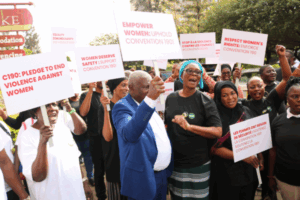More than six million people earning the national minimum wage will get a pay rise in March – a development that holds both promise and controversy. Trenton Elsley, Commissioner of the National Minimum Wage Commission, offers insights on how the policy affects different sectors and workers.
What is the profile of a person earning the minimum wage in South Africa in 2024?
While our research at the National Minimum Wage Commission (NMWC) and the existing literature offer insights, they don’t precisely define the profile of a minimum wage earner. To construct such a profile, I turn to our work on a decent standard of living. It considers a base set of socially perceived necessities (SNPs) reflecting the things agreed upon by diverse groups – men, women, urban and rural residents, poor and affluent – as the things you need to have a decent life in South Africa. We are working with 22 SNPs. By examining the households possessing these indicators and associating them with income levels, we can formulate a profile of a minimum wage earner.
Socially Perceived Necessity (SPN): item defined as essential by 50% or more of the population, or more stringent two thirds.
~ dslnow.net
The DSL research looks at per capita income. At the minimum wage level, approximately R4,500 per month, we expect that kind of household to possess at least 11 SNPs. They might likely have:
- a cellphone
- main electricity in the house (even if affordability is a separate concern)
- a fridge
- a place of worship in the local area
- a television
- clothing sufficient to keep warm and dry
- paid employment, at least one instance
- a support system for emotional well-being
- a house that is strong enough to stand up to the weather,
- someone to look after you if you are very ill
- a sofa
This profile doesn’t account for savings, noise pollution-free environments, or emergency transport, among other factors. It identifies the likely possessions and conditions of those earning the minimum wage using an established decent standard of living measure.
What are your thoughts on the 2024 minimum wage review, and how does the increase impact sub-minimum wages?
The 2024 review is good as it ensures the protection of the real value of the National Minimum Wage (NMW), although we acknowledge concerns about the relatively weak economy. The adjustment pegged at 8.5% according to the CPI +3 formula appears to be 3% above inflation, which is acceptable. However, the 5.5% CPI benchmark represents average inflation, and individual experiences may vary based on expenditure. For instance, rising food prices, a significant driver of inflation, disproportionately affect lower-income households.
The national minimum wage in 2024 is R27.58 per hour.
The minimum wage for domestic and farm workers is R27.58 per hour.
EPWP workers are entitled to R15.16 an hour.
While the increase safeguards the real value of the NMW, it does not constitute a substantial improvement for households. It is unfair to hold the lowest-paid individuals responsible for the economy’s well-being as if exerting more pressure on them would lead to a healthier economy. This causal relationship seems misplaced. Regardless, annual adjustments serve to keep the NMW in the public consciousness. More importantly, they reinforce the establishment of new norms that we aspire to cultivate as a country, creating awareness and understanding of the value associated with the NMW.
These are the sentiments of a domestic worker leader: "I am a domestic worker earning the NMW, but I am concerned I will lose my job." "How does the actual determination process of the NMW happen?" "We are excluded and unrepresented in social dialogue spaces, including public hearings". "Where is the data on non-compliance in the domestic work sector?". What would you tell this person?
Job security
Addressing the notion that wage increases lead to job losses is a simplistic economic perspective, a partial truth that warrants careful consideration. The commission noted the concern and introduced different implementing tiers – the NMW, farmworkers at 90%, and domestic workers at 75% of the NMW – to mitigate the risk of excessive job losses.
The primary determinant of a domestic worker retaining their job is related to the well-being of the households that employ them, especially within the middle class.
We must monitor middle-class employment trends. If these households face a significant loss of income it affects the ability to retain domestic workers at an acceptable wage level.
The decisive factor isn’t solely the payment to domestic workers but how middle-class households navigate relevant labour dynamics. Therefore, it’s essential to consider the broader economy, including industrial development and employment creation, when evaluating the domestic household economy. Additionally, the health of Small and Medium-sized Enterprises (SMMEs), a significant income source for the middle class, plays a vital role. Various initiatives aim to support SMMEs.
For farmworkers, challenges in the farming sector stem from complex factors affecting crop production and the global value chain. Blaming the NMW for issues in farming oversimplifies the challenges faced by the agriculture sector. The common notion of “raising minimum wages leads to job losses” is a cliché. This perspective is shortsighted, overlooking factors such as productivity, strategy, competitiveness, and technology. It’s crucial to move beyond simplistic analyses and consider the multifaceted elements that contribute to building a robust economy or company.
Compliance tracking
Obtaining compliance data, particularly for domestic workers, is proving challenging. Many households do not apply for exemptions from the Department of Labour and opt for non-compliance. Unlike companies that need to manage risk and be visible players in the game, these households often go unnoticed in the statistics. Indicators of compliance and non-compliance come from the analysis of national statistics, such as the quarterly Labour Force Survey, which examines payment practices to assess the value of the NMW.
I think relying solely on an inspection or regulation approach, where labour inspectors identify non-compliance and enforce it through legal action, has inherent limitations. The sheer number of workplaces, even within the formal sector, makes it impractical to have enough inspectors.
When private households are included as workplaces, the challenges multiply, and the politics surrounding inspections become more complex.
In a traditional workplace with hundreds of employees, there is a certain degree of regulation and anonymity for workers when an inspector visits. Inspecting private households has unique challenges. Firstly, the power dynamics make inspection an unsustainable and impractical form of regulation and secondly, there will never be enough inspectors.
We aim to develop new social norms. Establishing the legal requirement to pay a domestic worker a minimum of around R4,500 per month or R27.58 per hour is a step in creating a new norm. To transform this into a social norm where self-policing becomes prevalent, we need a dynamic where individuals hold each other accountable. This involves praising or shaming based on how much one pays a domestic worker. While this may sound idealistic, community policing systems often function because of established social norms. We must be realistic about the pace of changing social norms and the concurrent shifts needed to facilitate change. The NMWC must lead a national communication strategy that supports the shift in social norms and promotes the narrative and various aspects involved. A norm cannot truly be a norm unless it is embedded in the popular consciousness.
Key factors in the annual adjustment process
The NMWC comprises organised business and labour, community representatives and independent experts. The Department of Labour and Employment acts as a secretariat.
For the annual review process, the Commission takes account of changes in the economy and the labour market. These changes include relative living standards, the needs of the low-paid, employment levels, and economic performance and competitiveness. We also commission research to ensure evidence-based decisions.
Social dialogue spaces
While there are channels for public submissions and hearings, these may not be well-publicised, and those interested in making submissions should actively seek out the details. The communication of findings by the NMWC needs to be improved and better integrated into the public discourse.
Is there a plan to bring wages in the Expanded Public Works Programme (EPWP) in line with the NMW?
There were attempts to include the EPWP in the NMWC’s agenda, with the labour constituency showing a specific interest. However, the Commission does not have the power to adjust EPWP rates or make recommendations. The EPWP is designed to create jobs and operates on a short-term basis with its own rates, which are significantly lower than the NMW. Various parties, including officials from the Building and Construction Industry Negotiating Council, have raised concerns about the challenges posed by EPWP rates. On construction projects, classification as an EPWP initiative can lead to contractors opting for lower EPWP rates, which runs counter to the efforts of the bargaining councils to normalise pay rates in the construction sector. This position is difficult to accept, especially when considering strategies for advocating for vulnerable workers, such as EPWPs, community health workers and volunteer food handlers.
The question is whether EPWP positions should be considered typical jobs and if efforts should be making them permanent or full-time. We need to think carefully about the consequences of such a shift. Guarding against the informalisation of work is a valid concern, especially in cases such as volunteer food handlers, where a recognisable job is being informalised from above by powerful entities. However, the formalisation advocated for volunteer food handlers does not necessarily apply to the EPWP, which operates as a local initiative with a semi-formal to informal character. Classical formalisation may not be the most appropriate approach, and alternative understandings of the aims and nature of the EPWP may be needed.
What aspects of the national minimum wage implementation are you enthusiastic about? What aspect frustrates you?
Equalisation of the national minimum wage for domestic and farm workers is a significant achievement. Equalisation demonstrates the value of these jobs and gives workers greater visibility and recognition. The National Minimum Wage Commission has made modest but positive progress in raising the minimum wage without making harsh trade-offs. In other words, there have been no catastrophic falls in employment or hours worked due to equalising. I applaud the work that preceded the Commission and the national minimum wage. However, it is disheartening that there is significant non-compliance in South Africa’s labour market and no shared vision or trajectory for the NMW. The NMW often feels like a negotiation due to differing views on its purpose, benefits and drawbacks. Ideally, a shared vision and consensus for the national minimum wage would be more beneficial than constant negotiation.
What would be a significant achievement for your second term as Commissioner of the National Minimum Wage Commission?
A commission with a substantial role in shaping income and wage policies on a broader scale.
It was clear from the outset that the national minimum wage is not South Africa’s wage policy but rather a part of policies. I aspire for the NMWC to contribute meaningfully to developing a comprehensive suite of wage policies.
Compliance and non-compliance with the NMW is another focus area. We can do more to shift the narrative by promoting transformation beyond mere rules to actively shaping cultures that advance adherence to the national minimum wage.







